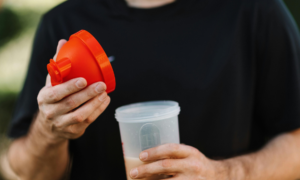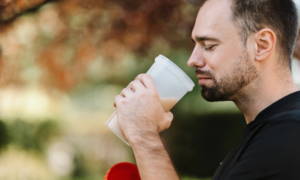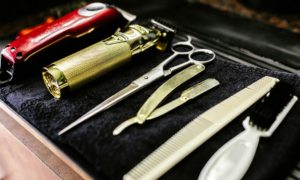Male testosterone levels naturally decline with age in fact a decline in testosterone can occur as early as age thirty. The hormone called testosterone is in charge of the development of masculine sexual traits. Hormones are chemical messengers that cause the body to undergo essential changes (Trusted Source). While not as much, females do generate testosterone as well.
If you have symptoms of low testosterone your doctor may request you get a blood test for analysis. There are three types of blood tests for testosterone: Total testosterone test, Free testosterone test, and bioavailable testosterone test. For men, the typical range of testosterone is 300–1,000 nanograms per deciliter (ng/dL).

SYMPTONS OF LOW TESTOSTERONE IN MALES
Symptoms of low testosterone can vary at different ages in males and may include:
- Shrinking testicles
- Erectile dysfunction
- Low or zero sperm count
- Enlarged breasts
- Low sex drive
- Loss of armpit hair / pubic hair
- Depression
- Decrease muscle mass and strength
AVERAGE LEVEL OF TESTOSTERONE IN MALES
| AGE | TOTAL TEST | FREE TEST | BIOAVAILABLE TEST |
| 40 | 252-916 ng/dl | 5.3-26.3 pg/mL | 101-499 ng/mL |
| 50 | 215-878 ng/dl | 4.2-22.2 pg/mL | 80-420 ng/mL |
| 60 | 196-859 ng/dl | 3.7-18.9 pg/mL | 69-356 ng/mL |
| 70 | 156-819 ng/dl | 2.2-14.7 pg/mL | 41-279 ng/mL |
After blood work your doctor have prescribe testosterone replacement therapy which comes in several different forms:
- testosterone skin gel
- testosterone patch
- testosterone tablets
- testosterone injections
- testosterone pellets
- testosterone gel
INCREASE YOUR TESTOSTERONE NATURALLY
Changing some aspects of one’s lifestyle that enhance general health and wellbeing is the greatest approach to raise testosterone levels. Listed below are best practices to gain testosterone naturally:
Exercise Any type of exercise, but particularly weightlifting and high-intensity interval training, can raise your testosterone levels.
Quality Sleep Testosterone levels can drop due to sleep deprivation, which is defined as obtaining less than five hours of sleep. Not only is the quantity of sleep crucial, but so is the regularity of the sleep schedule.
Avoid alcohol Research indicates that excessive alcohol use could lower testosterone levels. The testicular Sertoli cells, which are essential for the development of sperm, are also negatively affected by alcohol.
Diet Consume a diet rich in protein, healthy fats, and minerals like zinc, magnesium, and vitamin D. Maintain a balanced diet.
Vitamin D Increasing vitamin D supplementation has been shown in several trials to raise men’s total testosterone levels.
Reduce stress Reduced testosterone in males has been related to high levels of stress and the stress hormone cortisol. Increased food consumption, weight gain, and the buildup of dangerous body fat around your organs are further effects of stress and elevated cortisol levels. Testosterone levels may be adversely affected by these changes.







































